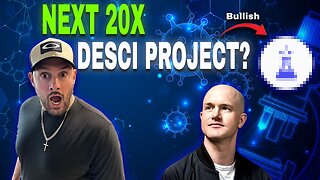Premium Only Content

The AI Boom Is Pulling Tech Entrepreneurs Back to San Francisco - The New York Times
🥇 Bonuses, Promotions, and the Best Online Casino Reviews you can trust: https://bit.ly/BigFunCasinoGame
The AI Boom Is Pulling Tech Entrepreneurs Back to San Francisco - The New York Times
Doug Fulop’s and Jessie Fischer’s lives in Bend, Ore., were idyllic. The couple moved there last year, working remotely in a 2,400-square-foot house surrounded by trees, with easy access to skiing, mountain biking and breweries. It was an upgrade from their former apartments in San Francisco, where a stranger once entered Mr. Fulop’s home after his lock didn’t properly latch. But the pair of tech entrepreneurs are now on their way back to the Bay Area, driven by a key development: the artificial intelligence boom. Mr. Fulop and Ms. Fischer are both starting companies that use A.I. technology and are looking for co-founders. They tried to make it work in Bend, but after too many eight-hour drives to San Francisco for hackathons, networking events and meetings, they decided to move back when their lease ends in August. “The A.I. boom has brought the energy back into the Bay that was lost during Covid,” said Mr. Fulop, 34. The couple are part of a growing group of boomerang entrepreneurs who see opportunity in San Francisco’s predicted demise. The tech industry is more than a year into its worst slump in a decade, with layoffs and a glut of empty offices. The pandemic also spurred a wave of migration to places with lower taxes, fewer Covid restrictions, safer streets and more space. And tech workers have been among the most vocal groups to criticize the city for its worsening problems with drugs, housing and crime. But such busts are almost always followed by another boom. And with the latest wave of A.I. technology — known as generative A.I., which produces text, images and video in response to prompts — there’s too much at stake to miss out. Investors have already announced $10.7 billion in funding for generative A.I. start-ups within the first three months of this year, a thirteenfold increase from a year earlier, according to PitchBook, which tracks start-ups. Tens of thousands of tech workers recently laid off by big tech companies are now eager to join the next big thing. On top of that, much of the A.I. technology is open source, meaning companies share their work and allow anyone to build on it, which encourages a sense of community. “Hacker houses,” where people create start-ups, are springing up in San Francisco’s Hayes Valley neighborhood, known as “Cerebral Valley” because it is the center of the A.I. scene. And every night someone is hosting a hackathon, meet-up or demo focused on the technology. In March, days after the prominent start-up OpenAI unveiled a new version of its A.I. technology, an “emergency hackathon” organized by a pair of entrepreneurs drew 200 participants, with almost as many on the waiting list. That same month, a networking event hastily organized over Twitter by Clement Delangue, the chief executive of the A.I. start-up Hugging Face, attracted more than 5,000 people and two alpacas to San Francisco’s Exploratorium museum, earning it the nickname “Woodstock of A.I.” Image More than 5,000 people attended the so-called Woodstock of A.I. in San Francisco in March. Credit... Alexy Khrabrov Madisen Taylor, who runs operations for Hugging Face and organized the event alongside Mr. Delangue, said its communal vibe had mirrored that of Woodstock. “Peace, love, building cool A.I.,” she said. Taken together, the activity is enough to draw back people like Ms. Fischer, who is starting a company that uses A.I. in the hospitality industry. She and Mr. Fulop got involved in the 350-person tech scene in Bend, but they missed the inspiration, hustle and connections in San Francisco. “There’s just nowhere else like the Bay,” Ms. Fischer, 32, said. Jen Yip, who has been organizing events for tech workers over the past six years, said that what had been a quiet San Francisco tech scene during the pandemic began changing last year in tandem with the A.I. boom. At nightly hackathons and demo days, she watched people meet their co-founders, secure investments, win over customers and network with potential hires. “I’ve seen people come to an event with an idea they want to test and pitch it to 30 different people in the course of one night,” she said. Ms. Yip, 42, runs a secret group of 800 people focused on A.I. and robotics called Society of Artificers. Its monthly events have become a hot ticket, often selling ou...
-
 4:31
4:31
CoachTY
20 hours ago $19.28 earnedCOINBASE AND DESCI !!!!
97.8K9 -
 10:02
10:02
MichaelBisping
20 hours agoBISPING: "Was FURY ROBBED?!" | Oleksandr Usyk vs Tyson Fury 2 INSTANT REACTION
47.2K12 -
 8:08
8:08
Guns & Gadgets 2nd Amendment News
2 days ago16 States Join Forces To Sue Firearm Manufacturers Out of Business - 1st Target = GLOCK
84.5K86 -
 10:17
10:17
Dermatologist Dr. Dustin Portela
2 days ago $17.24 earnedOlay Cleansing Melts: Dermatologist's Honest Review
127K10 -
 1:02:20
1:02:20
Trumpet Daily
2 days ago $39.71 earnedObama’s Fake World Comes Crashing Down - Trumpet Daily | Dec. 20, 2024
85.1K58 -
 6:29
6:29
BIG NEM
1 day agoCultivating God Mode: Ancient Taoist NoFap Practices
63.2K13 -
 30:53
30:53
Uncommon Sense In Current Times
2 days ago $10.66 earned"Pardon or Peril? How Biden’s Clemency Actions Could Backfire"
77.9K5 -
 40:01
40:01
CarlCrusher
1 day agoSkinwalker Encounters in the Haunted Canyons of Magic Mesa - ep 4
72.4K9 -
 59:44
59:44
PMG
2 days ago $9.71 earned"BETRAYAL - Johnson's New Spending Bill EXPANDS COVID Plandemic Powers"
74.2K46 -
 6:48:50
6:48:50
Akademiks
1 day agoKendrick Lamar and SZA disses Drake and BIG AK? HOLD UP! Diddy, Durk, JayZ update. Travis Hunter RUN
193K34